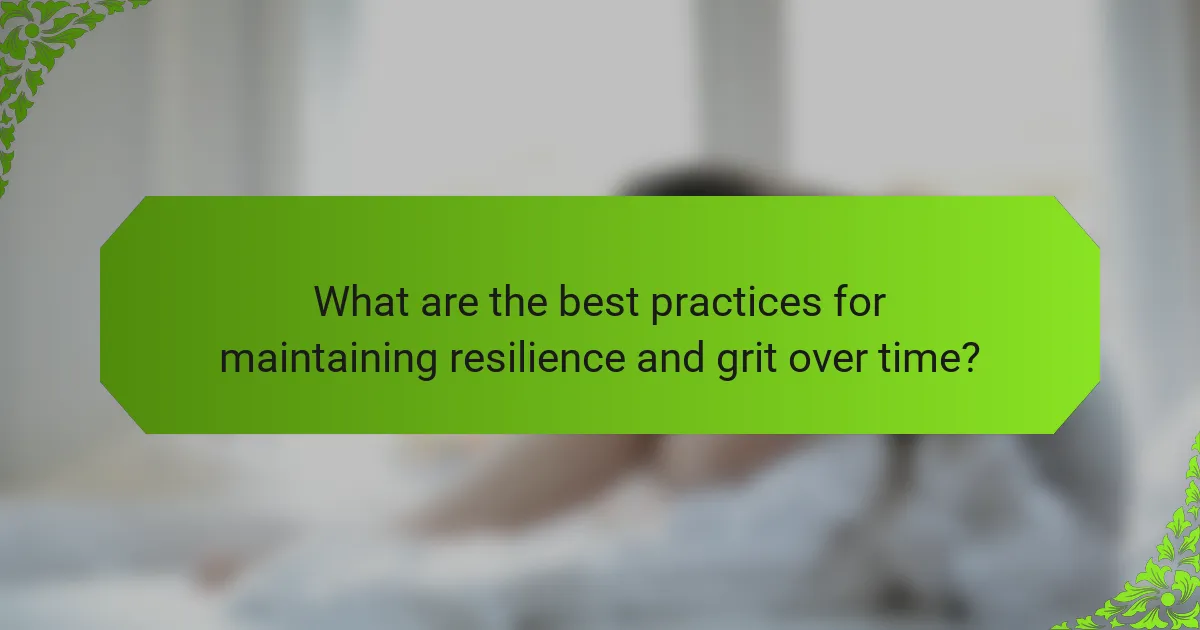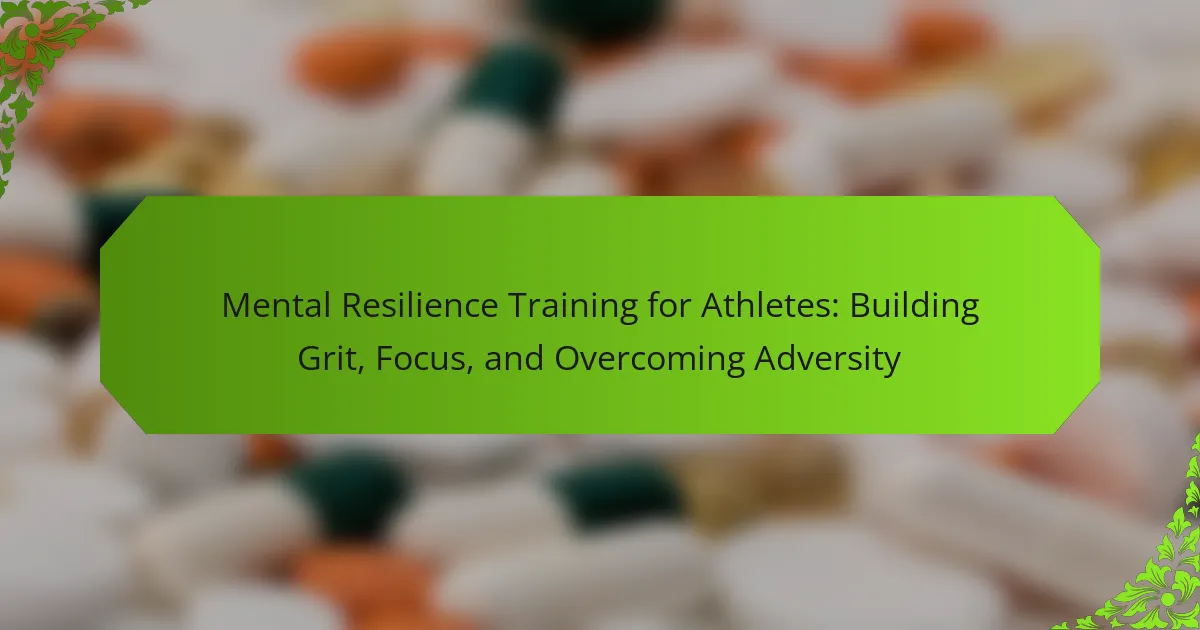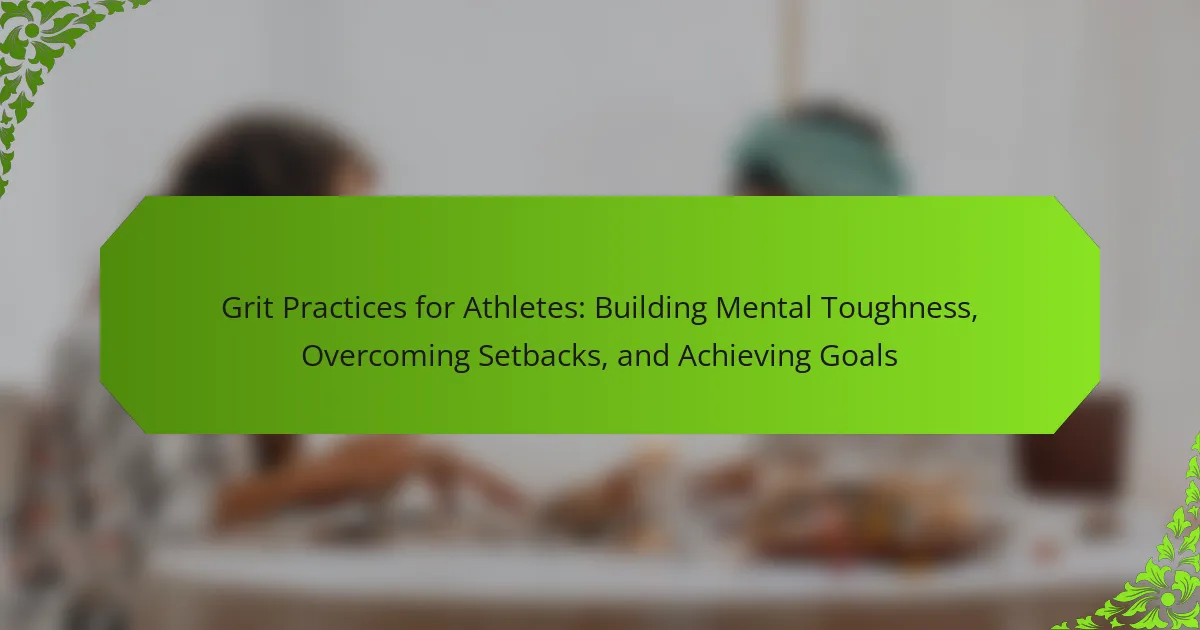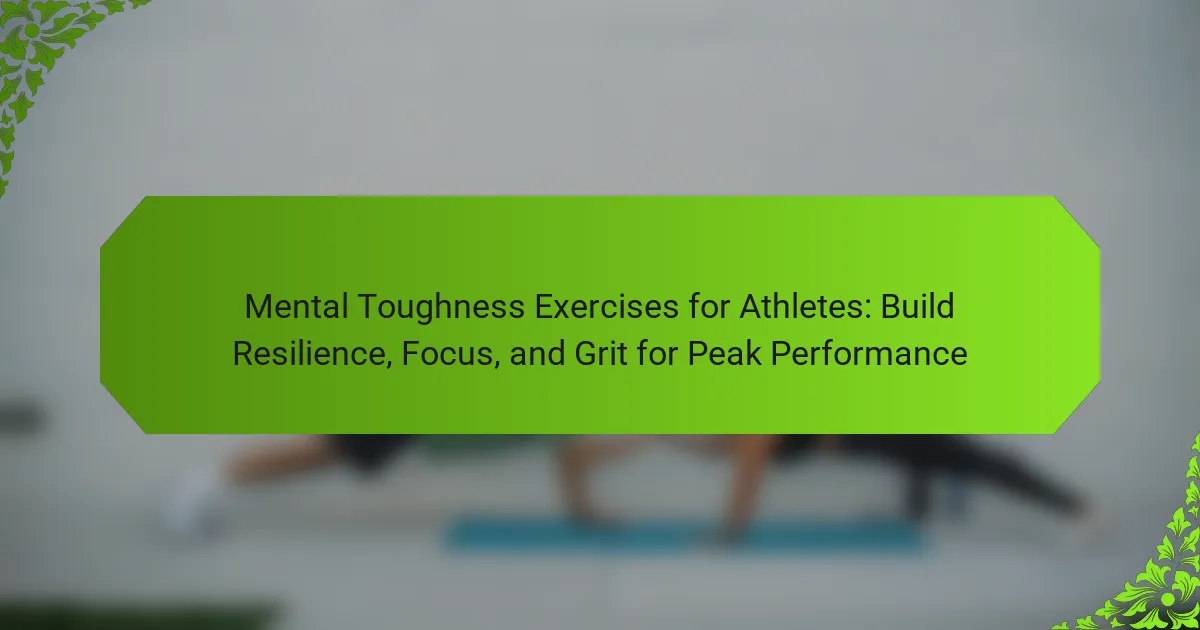Mental toughness strategies are crucial for athletes seeking to build resilience, grit, and focus for success. Key components include mental discipline, adaptability, and goal-setting. Universal strategies like visualization, mindfulness, and positive self-talk enhance mental toughness. Establishing strong support systems and embracing failure as a learning opportunity further fosters growth and resilience.

What are the key components of resilience and grit for amateur athletes?
Resilience and grit are essential for amateur athletes to overcome challenges and achieve their goals. Key components include mental discipline, adaptability, and goal-setting. Mental discipline involves maintaining focus and commitment during training and competition. Adaptability allows athletes to adjust strategies when faced with setbacks. Goal-setting provides direction and motivation, helping athletes measure progress and stay engaged. Together, these components foster a strong mindset that enhances performance and encourages persistence.
How does mental toughness influence athletic performance?
Mental toughness significantly enhances athletic performance by fostering resilience, grit, and focus. Athletes with high mental toughness can better manage stress, maintain motivation, and recover from setbacks. Research indicates that mental toughness correlates with improved performance metrics, such as endurance and skill execution. Additionally, mental toughness strategies, like visualization and goal-setting, can lead to consistent peak performance under pressure.
What role does focus play in building resilience?
Focus is crucial for building resilience as it enables athletes to maintain clarity and direction during challenges. When athletes concentrate on their goals, they can better manage stress and setbacks. This mental discipline enhances grit, allowing them to push through adversity. Research shows that focused individuals exhibit greater perseverance, leading to improved performance and mental toughness. By cultivating focus, athletes can transform obstacles into opportunities for growth.
What are the common challenges faced by amateur athletes?
Amateur athletes commonly face challenges such as lack of mental toughness, inconsistent focus, and difficulty managing stress. These obstacles can hinder performance and progression. Developing resilience and grit is essential for overcoming these issues. Mental toughness strategies, like visualization and positive self-talk, can enhance focus and build confidence. Additionally, setting realistic goals and maintaining a balanced training regimen contribute to sustained motivation and success.
How can understanding these challenges enhance mental toughness?
Understanding challenges enhances mental toughness by fostering resilience, grit, and focus. Athletes who confront and analyze difficulties develop strategies to overcome adversity, strengthening their mental framework. This process encourages growth through reflection and adaptation. As a result, athletes become more equipped to handle pressure and setbacks, ultimately improving performance.

What are universal strategies to develop resilience in sports?
To develop resilience in sports, athletes can adopt several universal strategies. These include setting clear goals, maintaining a positive mindset, practicing mindfulness, and fostering strong support systems. Each strategy enhances mental toughness, grit, and focus, essential for success in competitive environments.
Setting clear goals provides direction and motivation, while a positive mindset helps athletes overcome challenges. Mindfulness practices, such as meditation, improve focus and reduce anxiety. Lastly, strong support systems, including coaches and teammates, offer encouragement and guidance during difficult times.
How can goal-setting improve grit and determination?
Goal-setting enhances grit and determination by providing clear objectives, fostering motivation, and promoting resilience. It allows athletes to focus on specific targets, which strengthens their commitment during challenges. Studies show that setting measurable goals increases persistence and reduces the likelihood of giving up. Moreover, the process of achieving these goals builds confidence, reinforcing mental toughness. This unique attribute of goal-setting is crucial for athletes aiming for long-term success.
What techniques enhance mental focus during training?
To enhance mental focus during training, athletes can employ techniques such as visualization, mindfulness meditation, and goal setting. Visualization helps create a mental image of success, improving concentration. Mindfulness meditation reduces distractions and promotes present-moment awareness. Goal setting provides clear objectives, fostering motivation and focus. Each technique builds mental toughness, essential for resilience and grit in sports.
How does positive self-talk contribute to resilience?
Positive self-talk enhances resilience by fostering a growth mindset and reinforcing confidence. This mental strategy helps athletes manage stress and recover from setbacks. Research shows that athletes who engage in positive self-talk exhibit higher levels of grit and focus, leading to improved performance. By replacing negative thoughts with constructive affirmations, athletes build mental toughness, enabling them to face challenges more effectively.

What unique practices can set amateur athletes apart in their mental training?
Amateur athletes can enhance their mental training through unique practices like visualization, mindfulness, and goal-setting. Visualization involves imagining successful performances, which boosts confidence and reduces anxiety. Mindfulness techniques help athletes stay present, improving focus during competition. Goal-setting, particularly with SMART criteria, fosters motivation and accountability, driving consistent progress. These strategies cultivate resilience, grit, and focus, setting athletes apart in their mental preparation.
How can visualization techniques enhance performance?
Visualization techniques significantly enhance performance by improving focus, reducing anxiety, and boosting confidence. Athletes can mentally rehearse successful outcomes, which fosters a resilient mindset. Studies show that visualization can lead to a 20% increase in performance metrics by enhancing mental toughness. This technique helps in developing grit, allowing athletes to push through challenges and maintain concentration during competitions.
What is the impact of mindfulness on resilience building?
Mindfulness significantly enhances resilience by fostering greater emotional regulation and focus. Practicing mindfulness helps athletes manage stress, allowing them to recover quickly from setbacks. Research indicates that mindfulness training can improve mental toughness, leading to increased grit and sustained performance under pressure. Athletes who incorporate mindfulness techniques report higher levels of confidence and adaptability, essential traits for resilience building.
How can journaling foster grit and self-reflection?
Journaling fosters grit and self-reflection by encouraging athletes to process experiences and emotions. This practice enhances mental toughness by promoting self-awareness and goal-setting. Regularly documenting thoughts helps identify patterns, challenges, and progress, reinforcing resilience. Research indicates that self-reflection through journaling can lead to improved focus and performance in high-pressure situations.

What rare attributes can significantly boost an athlete’s mental toughness?
Rare attributes that can significantly boost an athlete’s mental toughness include visualization techniques, self-talk strategies, emotional regulation, adaptability to change, and a strong sense of purpose. Visualization enhances focus and prepares athletes mentally for competition. Positive self-talk reinforces confidence and resilience. Emotional regulation enables athletes to manage stress effectively during high-pressure situations. Adaptability allows athletes to cope with unexpected challenges. A strong sense of purpose drives motivation and commitment to long-term goals.
How does adaptability in training conditions enhance grit?
Adaptability in training conditions significantly enhances grit by promoting resilience and mental flexibility. Athletes who face varied environments develop coping strategies that improve their focus under pressure. This exposure fosters a unique attribute of mental toughness, as athletes learn to embrace challenges and setbacks. As a result, they build a stronger commitment to their goals. Research indicates that athletes who adapt to different training stimuli perform better in competitions, demonstrating the value of grit in achieving success.
What uncommon mental exercises can improve resilience?
Practicing uncommon mental exercises can significantly enhance resilience in athletes. Techniques such as visualization, mindfulness meditation, and embracing discomfort cultivate mental toughness. Visualization involves imagining successful performances, which can boost confidence and focus. Mindfulness meditation helps athletes stay present, reducing anxiety and enhancing emotional regulation. Embracing discomfort, through cold exposure or challenging workouts, builds grit and adaptability. These strategies foster a robust mental framework essential for overcoming challenges and achieving success.
How can community support strengthen mental toughness?
Community support significantly enhances mental toughness by providing emotional backing and fostering resilience. Athletes benefit from shared experiences and encouragement, which can improve focus and grit. Engaging with a supportive network helps individuals navigate challenges, reinforcing their mental fortitude. Studies show that athletes with strong community ties exhibit higher levels of perseverance and motivation, leading to improved performance and success.

What are the best practices for maintaining resilience and grit over time?
To maintain resilience and grit over time, athletes should adopt consistent mental toughness strategies. Regular goal-setting cultivates focus and motivation. Practicing mindfulness enhances self-awareness, enabling better emotional regulation. Engaging in positive self-talk reinforces belief in abilities. Establishing a support network provides encouragement during challenges. Embracing failure as a learning opportunity fosters growth and resilience.
How can athletes avoid burnout while building mental toughness?
Athletes can avoid burnout while building mental toughness by prioritising recovery, setting realistic goals, and practicing mindfulness. Incorporating regular rest days and active recovery can enhance resilience. Setting achievable, incremental goals fosters a sense of accomplishment. Mindfulness practices, such as meditation, improve focus and emotional regulation, contributing to mental toughness. Balancing training intensity with these strategies helps maintain motivation and prevent burnout.
What common mistakes should athletes avoid in their mental training?
Athletes should avoid common mistakes in mental training, such as neglecting self-awareness, failing to set specific goals, and resisting adaptability. These errors can hinder mental toughness development.
Neglecting self-awareness prevents athletes from understanding their strengths and weaknesses, limiting growth. Setting vague goals leads to a lack of direction and focus, undermining motivation. Resisting adaptability can create rigidity, making it difficult to respond effectively to challenges.
Incorporating regular reflection, SMART goals, and flexible strategies enhances mental resilience. This approach fosters grit and focus, essential for athletic success.
What expert insights can guide amateur athletes in their mental toughness journey?
To build mental toughness, amateur athletes should focus on developing resilience, grit, and concentration. Strategies include setting clear goals, practicing visualization techniques, and maintaining a positive mindset. Regularly engaging in mindfulness exercises enhances focus and reduces stress. Additionally, seeking feedback from coaches and peers fosters growth and accountability.



